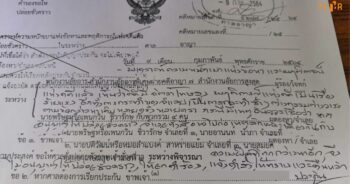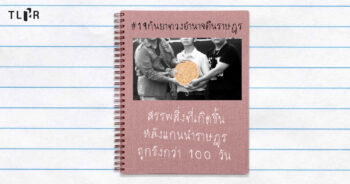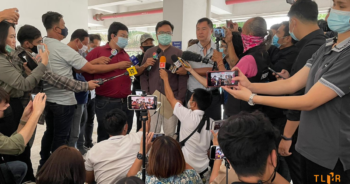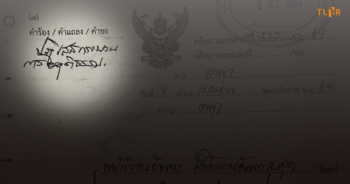(Published in Thai on 15 February 2020)
Around one week ago, four men were sitting on a bench in front of the Criminal Court’s arraignment room. The room’s interior is decorated similarly to trial rooms where the judge would preside the throne erected high above our heads.
The youngest man wearing square-shaped glasses was still in his final year of college, almost graduating from Thammasat University’s Faculty of Political Science.
The man sitting next to him is Bank, Mor Lam (Folk singer from Isan or Thailand’s northeastern region) from Khonkaen Province. He has been trying to begin a new life after facing more than two years’ imprisonment for the lèse majesté offense under the Criminal Code’s Section 112. The charge stemmed from his participation in the “Wolf Bride” theatre play in 2013.
The next person is a human rights lawyer who had helped those facing charges due to their political expressions since 2010.
The last man is a middle-aged man who served seven years in prison under Section 112 for his role as an editor of the Voice Of Thaksin magazine.
Each of them is different in backgrounds and ages. However, their lives have been entangled by a lawsuit against their political activity after security agencies have alleged their words and thoughts “defame the monarchy.” They also had been imprisoned for over two weeks since the Court denied their bail requests during the inquiry phase in last year’s October.
Last week, the quartet had to encounter a similar fate when they were counting back the time, anxiously waiting for the Court to decide whether they would have to fight the lawsuit in prisoner uniforms or in the outside world.
Nevertheless, the four hours spent inside the arraignment room, as well as their lives behind bars, seem to be a veiled secret that only their lawyer could witness. Therefore, Thai Lawyers for Human Rights (TLHR) has invited the defense lawyer representing the four defendants to discuss what happened before the incident that had changed their entire fate – when the Court of First Instance denied bail for Parit “Penguin” Chiwarak, Arnon Nampa, Somyos Prueksakasemsuk and Patiwat “Mor Lam Bank” Saraiyaem and sent them to prison without having started examining any witnesses or ruled whether they are guilty.
Rushed prosecution: Prosecutor indicted defendants within less than two weeks after receiving case files from the inquiry officer
“I did not expect that the prosecutor would file an indictment on that day [9 September 21] at all,” the defense lawyer recounted what happened with lingering shock after the incident.
From 18 September 2020 when the Free Youth Movement kicked off their demonstrations to 14 February 2021, at least 198 legal actions have been taken against protestors and others who have exercised their freedom of expression. While most cases currently remain at the inquiry stage, the public prosecutor has gradually begun to prosecute many people. Nevertheless, some remarkable features are worth highlighting in the case of the #19SeptTakeBackThePeople’sPower demonstration, starting during its inquiry phase.
“Last month, an inquiry officer from the Chana Songkram police station notified the defendants in this case about the appointment for forwarding the case to the public prosecutor. However, the defendants wished to postpone the appointment. The police responded that if the defendants adjourned the appointment, they would request an arrest warrant. Although the Court eventually informed the defendants that no arrest warrant was issued, this incident made me wonder why the authorities were considering issuing the arrest warrant. Typically, during this stage of submitting the case to the prosecutor, the defendants should be able to schedule an appointment freely in accordance with their availability.
“On 9 February, police officers from the Chana Songkram police station also came to the Court to check whether the defendants attended the appointment with the prosecutor or not. If the defendants did not go, the authorities would prepare to issue an arrest warrant. Normally, if the defendant failed to show up, the prosecutor would be taking the initiative to request the police to issue the warrant. The police did not need to rush the process to get the warrant on that very day.”
In the morning of 9 February 2021, four of them filed a petition asking the prosecutor to conduct additional investigations by examining Sulak Sivaraksa and Chamnan Chanrueng about the enforcement of Section 112 in the contexts of Thai society and international laws.
“Normally, upon receiving the petition, the prosecutor will have to conduct more investigations and postpone the indictment appointment. In previous cases where we have filed similar petitions, the prosecutor proceeded with the process in such a manner. If they would like to prosecute the defendants, the prosecution order could be issued during the rescheduled appointment. Accordingly, it was possible to postpone the appointment. No laws forced them to file the indictment on 9 February only.
After submitting the petition and waiting to hear the prosecutor’s order, I thought that the appointment might be postponed. However, the prosecutor spokesperson subsequently made a public announcement affirming they would indict the defendants, so I thought to myself that the defendants probably would not be granted bail. In principle, there was no good reason for denying the bail because the defendants had consistently reported to the authorities to acknowledge the charges and never attempted to flee.”
The lawyer did not expect that would be the last day that the quartet would enjoy their freedom. Still, the activists themselves felt like they knew in advance that they would have to step into prison on that day, even though the situation was difficult to grasp for them who have been working hard to demand “justice” in society.
“Today, I am ready. I didn’t even bring my car”
“One day before the appointment date [8 February 2021], I spoke with Somyos about submitting a petition to the prosecutor on the following day. We also talked about the case. I thought that the indictment would not be ordered yet. Why would the process occur that fast? The police only submitted the inquiry file to the prosecutor less than two weeks earlier. Meanwhile, Somyos could foretell that he would be indicted because the police told him the prosecutor and the police jointly had developed the file together. Hence, it is already quite complete.”
“When I talked to him on the phone on that day, I felt like he was strangely calm. He probably already could tell what would soon happen, so he asked me to take care of many things. On the appointment date, he decided to wear sandals. He told me, ‘I am ready today. I didn’t even bring my car.’
While waiting for the bail decision, he probably expected that the Court would not grant bail today. When the Court finished deliberating, we came down from the Court’s upper floor to the arraignment room to hear the ruling. He asked me if he should go on a hunger strike or commit suicide, so I said, ‘Hold on, brother. Please don’t say that. Calm down.’
Somyos’s statement reflects the sentiment of someone who just got to enjoy freedom after facing imprisonment for a long time yet realized that he would have to go back inside again. On the other day [10 February 2021], I visited Somyos at the prison, and he said to me,
“Don’t worry. Don’t be concerned.”
“I didn’t expect that they would put me in jail on that day”
“I think we will be granted a bail release. They are playing a mind game with us, making us worried that we would not get it. I think there is no reason why the Court would not grant the bail. Our imprisonment could otherwise serve as a catalyst prompting people to be aware of the injustice and come out to organize protests,” Penguin responded to his lawyer’s question as they were waiting for the bail decision in the arraignment room.
“On that day, Penguin was the only person who expected to be released on bail. He did not prepare anything. He didn’t even ask his mother to come to the Court, even though she would normally accompany him to almost every appointment,” said the lawyer.
“On the next day, I met Penguin’s mother at the prison. She looked like she had just cried before. She could not stop staring at the prison, showing her desire to see and talk to her son.
“She regretted that she didn’t go to the Court on that day. She told me that she would always accompany him. However, for the appointment on 9 February, Penguin said to her that it was just an appointment to report to the Court. ‘Tomorrow’s appointment is no big deal, mom.”
While visiting Penguin at the prison, the lawyer asked Penguin about his expectation for the bail decision.
“I didn’t expect that they would put me in jail on that day at all,” Penguin answered.
“They put me in jail every time I come to Bangkok. I don’t want to come to Bangkok anymore.”
“When Bank was detained in October, he said he never understood why he was arrested. He was not even a protest leader. On that day [19 September 2020], he merely delivered speeches which propose for an amnesty program for lèse majesté convicts, which did not even touch on monarchical reforms as many protest leaders did,” the lawyer stated.
“He spoke about amnesty because he wanted to restart a new life, to have a clean slate. The amnesty scheme will also place the monarchy in a good and stable position, so I did not think he would be prosecuted again.
Even though I am not Bank’s lawyer in this case, I represented him for his first case [lèse majesté charge for performing in the “Wolf Bride” theatre show]. While waiting for the bail decision, I got to talk to Bank about many things, such as his life problems, family, work, and social injustices. Bank even cried aloud. [Brief pause] After he got out of prison for his first offense, his life has never been the same.
Bank’s mother recently passed away. His Mor Lam career has been suspended because of the COVID-19 pandemic. He had planned to set up an online Mor Lam studio, but he ended up having to go to prison again. Bank might be thinking that he has not had a chance to start a new life yet, and now he has to return to prison.”
“They put me in jail every time I come to Bangkok. This time is no different. They are putting me in jail again. I don’t want to come to Bangkok anymore. Even though I have always reported to the authorities on the appointment dates, they still decide to imprison me,” the lawyer quoted what Bank said in the arraignment room.
“After the prosecutor ordered the indictment, Bank would like to talk to the judge to explain his intention and say that he did not violate the law. However, according to the criminal procedure, the judge who delivers an indictment order and the judge who decides on granting bail must be different persons from different units. The one delivering the order only reads aloud what the document says and informs the defendants of their rights. They do not have the authority to launch additional investigations or use any discretion to change the decision. Meanwhile, the one responsible for reviewing bail requests only take into consideration the indictment document; they only see the paperwork without assessing any other pieces of evidence.
It would be great if the defendants could have a chance to explain – to speak out so that the Court could meet them and listen to their explanation. When I visited Bank at the prison, he also asked me when he would get an opportunity to explain to the Court.”
“Arnon has expected and prepared himself for going to prison, but that does not mean he could tolerate or understand what happened to him.”
“On that day, Arnon wore a sweater on top of his t-shirt. He had perhaps thought that he would be going to prison. Upon hearing the indictment order, we talked about our plans for the next steps, especially how we would proceed with the lawsuit and whether and when we would file for an appeal.
He probably knew that it was time for him to go to prison. However, if someone asked if he understood what was happening to him, I do not think anyone could comprehend such an incident. Even though Arnon had foreseen this scenario and prepared himself for going to prison, that does not mean he could easily tolerate it. It would be difficult for anybody- no matter Arnon, other defendants, or myself- to accept that they would be going to prison because of the reasons provided by the Court, despite having reported to the authorities consistently.
“This imprisonment is not just. The Court said that the defendants repeated unlawful actions several times. I believe that the Court’s order contained bias against pro-democracy groups. Firstly, our actions were not unlawful. The defendants could still argue that they had the rights and freedom of expression to deliver protest speeches. Furthermore, the plaintiff’s indictment order acknowledged that the defendants delivered the speeches openly with goodwill. They did not commit anything illegal in secrecy. Considering the speeches word by word, no content could be deemed as defamatory. There were only criticisms of public issues through words that the public could easily understand.
The Court’s bail decision also refers to the defendants’ previous actions and regards such activities as potentially unlawful. It implies that every speech delivered by the defendants contains illegal content. However, I wonder if the Court actually knows which topics each speech touched on. The defendants might be talking about something else or have evidence supporting their messages.
The refusal to grant bail means that the defendants would have to remain in prison as they await their trial even though the Court has not ruled that they are guilty. According to the Criminal Procedure Code, everyone should have the right to receive bail, which could protect the defendants from the presumption of guilt. As the domestic law already guarantees this right, we do not even need to refer to the International Covenant on Civil and Political Rights (ICCPR), which extends protection over this issue.
“When we went to the arraignment room to hear the Court’s indictment order, everybody went silent. We did not know what to say because their arguments are based on a totally different way of thinking.”
“This is hard for anybody, especially the defendants, to accept and understand.”
Before ending the conversation, we asked the lawyer about the possibility that freedom would be returned to the four defendants.
“My answer to that question is based on my past experience. When I represented Bank as his lawyer for the case of the “Wolf Bride” theatre play during the NCPO regime, we never got bail no matter how many times we have requested it. Bank and Golf, another defendant, eventually decided to plead guilty. If they had fought the lawsuit without bail, they would have had to remain in prison for at least one year. In lèse majesté cases, if the defendant confesses to the crime, the Court might hand a five-year prison sentence and reduce it by half to 2.5 years. Therefore, either way, they would have to be imprisoned for roughly the same amount of time. Perhaps they might even get out faster than those who deny the charge and fight the lawsuit.”
It is as if the stories of lese majeste cases during the NCPO era are being replayed. One week later, the Court of Appeal insisted on denying bail for the four defendants. The Court claimed that they are facing serious sentences. Therefore, if they were released, they may cause public disorder on a large scale. Their protest speeches also hurt many Thai people loyal to the monarchy deeply. Furthermore, if they were granted the release, they might attempt to escape.
Until now, we still do not know for sure how many days or years we will see these four people in the outside world again.
Bail requests denied 4 times within a month
On 9 February 2021, the four pro-democracy activists were indicted for alleged violations of Article 112 (Lèse-majesté) and Article 116 (Sedition) of the Criminal Code and Act of Ancient Monuments, Antiques, Objects of Art, and National
Museums, B.E. 2486. All of them were charged due to the public assembly on 19 September 2020. In addition, Parit was also charged for alleged violations of Article 112 of the Criminal Code (Lèse-majesté); 116 of the Criminal Code (sedition); and the Emergency Decree, in relation to the public assembly held on 14 November 2020.
The defense lawyer submitted bail requests to the Criminal Court four times on 9, 17, 22 February, and 4 March 2021. Also, the lawyer filed an appeal to the Court of Appeal against the Criminal Court’s order denying bail requests two times on 9 and 27 February 2021. However, the bail requests and filings of an appeal were all denied by the Criminal Court and the Court of Appeal.
As a result, the quartet is still detained “awaiting the trial” for a month when the verdict has not reached, thereby depriving them of the rights to fair trial.




